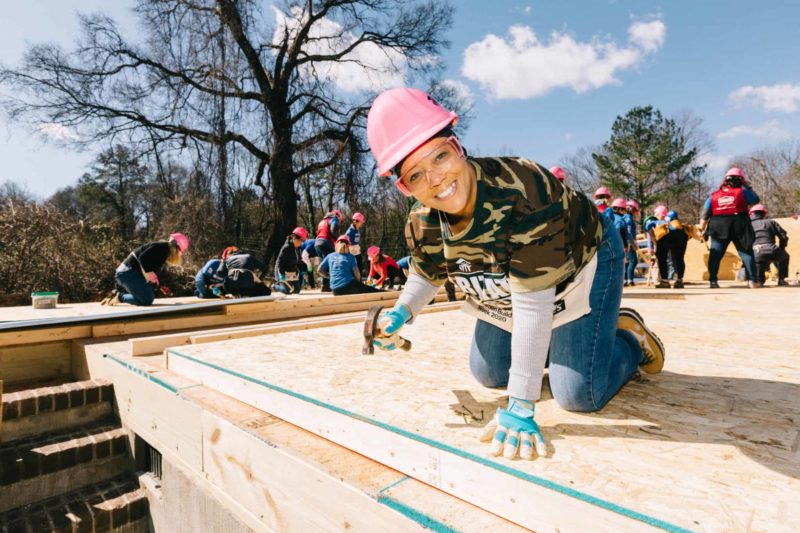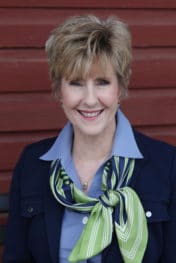NEWS
The More Things Change: Q&A with Chris Ahearn Former CEO of Our Towns Habitat for Humanity

This future owner seems happy to add her sweat equity to the construction of her home. Amidst the pandemic, Latawnya and Habitat for Humanity volunteers have continued to work on her home and hope she can move in early this summer. (Marcello Aquino photo)
News of Davidson caught up with Chris Ahearn just a few days after her final day as CEO of Our Towns Habitat for Humanity, and a few months after the boards of Habitat for Humanity-Charlotte and Our Towns Habitat announced plans to combine the two affiliates to serve more low-income, working families with decent housing they can afford.
We had some questions.
NOD: You took on the leadership of Our Towns Habitat for Humanity in 2018. When did the idea of merging with Charlotte Habitat first come up?

Chris Ahearn
Chris: We began conversations with Charlotte to explore the possibility of a merger about eight months ago — as Our Towns’ financial realities became clear. The availability of land in the North Mecklenburg was scarce, to say the least, construction costs were high, and many of our homes showed deferred maintenance. We found ourselves serving fewer families versus serving more. We could see that we were heading for trouble. The idea of change was in the air.
NOD: Did you and the Board take any steps to mitigate the issues?
Chris: Sure. First, we cut expenses dramatically and began to contract our marketing services with Charlotte Habitat, then decided to contract with them to manage our mortgages as well.
NOD: And how did that go?
Chris: Of course, it helped, so we decided to ask a committee of the Board to look further, to explore whether it would make sense to combine our operations. The group worked together over a number of months before coming to a decision to merge.
NOD: The merger became effective as of February 28. Did you know you would be out of a job?
Chris: (laughing) Yes, I did. It was always part of our conversations — I expected it from the beginning. But look, the combined affiliate —Habitat Charlotte, which now comprises a territory stretching from Statesville to Pineville — is expected to save approximately $6 million over the next decade, which can be used to fund more affordable housing and critical repairs.
This is a positive move all around, given our overall mission of affordable housing and the value of home ownership. The Charlotte Habitat and Our Towns teams are working together to make this a smooth transition. Charlotte Habitat has a number of mature processes that the legacy Our Towns team can learn from.
NOD: Our Towns Habitat had its roots in the efforts of Davidson folks beginning in the 1960s.
The change feels a bit emotional to some in the community.
Chris: There’s reason for pride there, for sure. It’s inspiring. But we really think that people will not see major changes. Our board was determined to keep a local presence for our clients and volunteers. The ReStore remains and will become even better with planned improvements. The office next door remains open and is staffed to serve our clients just as before, working on resource development, family services, construction, and volunteerism.
NOD: The Davidson and Lake Norman region has been generous to Our Towns Habitat. Will their contributions continue to go to North Mecklenburg?
Chris: Absolutely. Donors can direct donations to one area or make general contributions to serve the mission overall. And Restore profits (there are seven stores total) will be used to fund Habitat projects across the region. Our local Restores — Statesville, Mooresville and Davidson-Cornelius stores —funded almost five houses this past year.
NOD: We know that land is scarce, but also key to the ability to build new homes. Do you know where that stands?
Chris: Habitat owns one lot in Davidson. There’s some land in Mooresville, and Statesville the Town of Huntersville will be donating six buildable lots. Habitat volunteers will be doing critical repairs on current homes, in addition to building houses. And we are finalizing talks with the Town of Davidson to move and renovate a house to be displaced in constructing the Sloan-Potts connector.
NOD: It does sound encouraging.
What’s ahead for you? Are you retiring? Will you stay involved in Habitat work?
Chris: I have loved the mission of Habitat for Humanity since I first volunteered on a project with my church more than 20 years ago. When you work alongside a homeowner in process, you come to understand what affordable housing means to a family that doesn’t have the luxury of taking that basic need for granted. You’ll definitely see me on a construction site from time to time, and my husband Jack and I will continue to support the mission financially.
I have too much energy to retire! I’m in the process of establishing a communications consulting practice, and am volunteering with a couple of community organizations, including the Davidson Community Foundation and Davidson College Presbyterian Church.
NOD: Thank you for your time and for all your service to the community. Final thoughts?
Chris: Any time there is consolidation of nonprofit organizations, especially one as beloved to Davidson as Habitat for Humanity, there are questions about how people in our community will continue to be served. Both Our Towns and Charlotte’s Boards of Directors were adamant that the result of this combination had to be more families served than either affiliate could serve on its own. While the COVID-19 crisis and its impact on Habitat income may affect the number of families served this year, the intent is clear — a strong Habitat presence in the greater Lake Norman area, and the ability for more low-income, working families to have a safe, decent place to call home.
Meg Kimmel
A professional communicator with a long career in higher education, Meg now consults and volunteers in areas where words and images work together to tell a story. She's a proud member of Davidson's Class of 1977 and lives nearby with her husband, Don, Davidson professor emeritus of biology, with whom she shares a family grown by kinship and choice.


